#kether does a datamining
Explore tagged Tumblr posts
Text
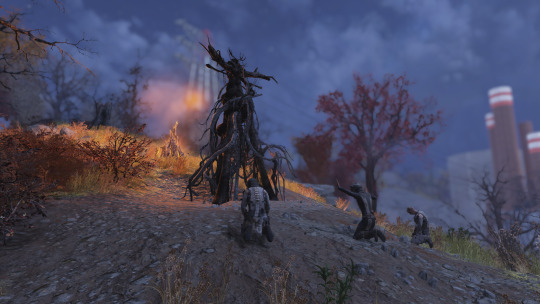
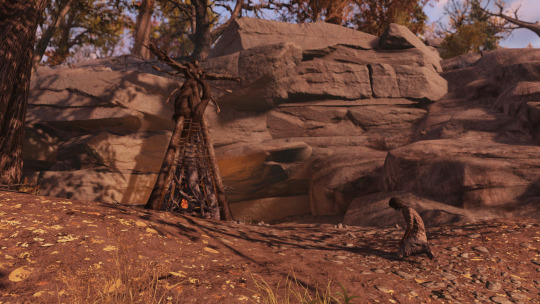
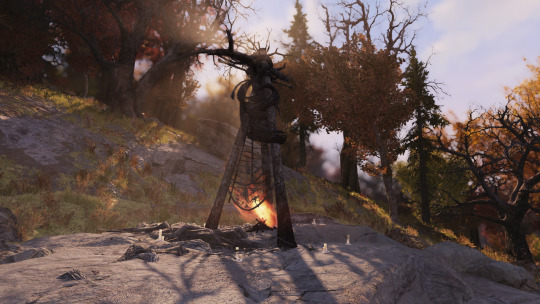
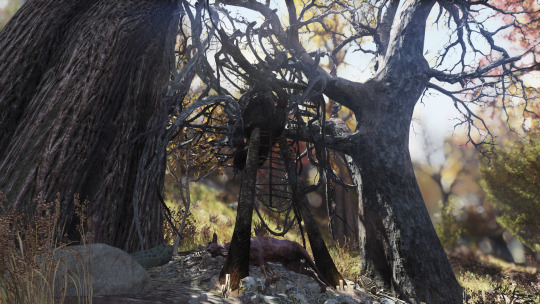
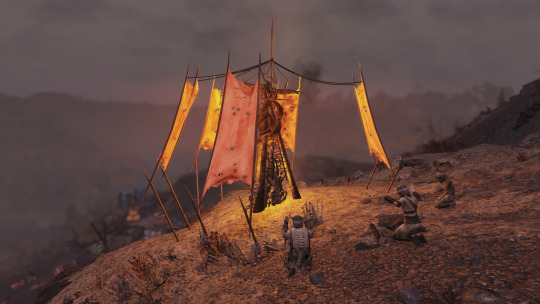
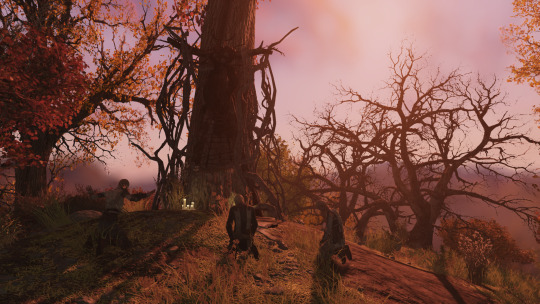


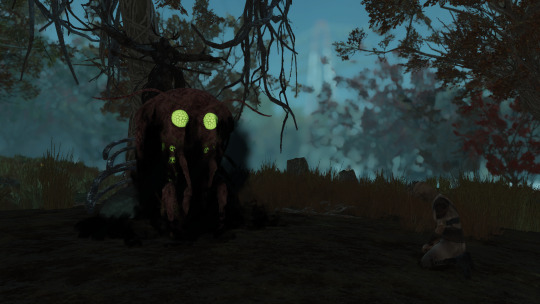
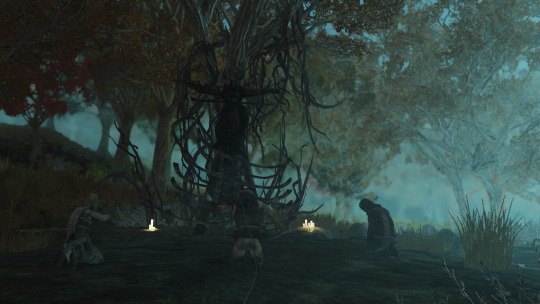
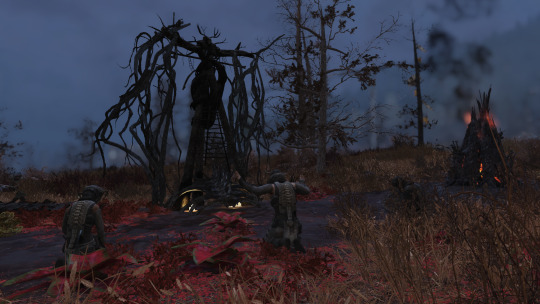
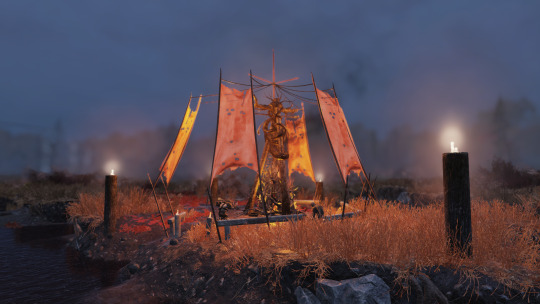
Selection of unmarked shrine sites of the Cult of the Mothman
(Some may have been added for the Atlantic City update, as they were not present last time I listed things with Ecks. Location list below a cut.)
NW of Poseidon Energy Plant
W of Camp McClintock
Organ Cave West (North's totem was already there)
SW of Gilman Lumber
S of Brim Quarry
E of Transmission Station 1AT-U03
between "Carhenge" and the Covered Munitions Factory
NW of the Mysterious Cave
SE of Big Maw
NE of Gnarled Shallows
S of Superior Sunset Farm
E of Old Mold Quarry
29 notes
·
View notes
Text
Halsin's Sorrow from early access
The old datamine looks like an alternate universe. I find some parts of it much interesting than in the full release. The part of Isobel's death, when Halsin killed her in self defense, after she attacked him for unknown reasons. Then Ketheric unleashed the shadow curse. These events were mentioned in Halsin's diary. And it's really emotional.
---------- [This is an ancient notebook, whose ink is faded and pages are starting to crumble. It's not easy, but some words can still be made out.]
How do you describe events like these? An accident? A tragedy? The cruelty of fate?
It does not matter. Isobel is just as dead.
I can't remember what happened with any clarity. We were negotiating. She with [...] I led the druids. [...] words grew heated [...] threw the first punch. It was mayhem.
[...] stared at me, my glaive's blade buried in her stomach and shock in her eyes. I can't believe she wanted to hurt me. It was pure instinct - the heat of combat.
[...] washed the blood from my hands. My glaive was still there, coated in her blood, but something else felt different. There's a sickness in the blade. It seems cursed, but by whom? Selûne herself?
It is locked away now. I do not trust its power in the wrong hands. And I never want to see it again. ---------- In Ketheric, I see my errors made manifest. He did not fall - he was pushed. His grief was twisted by shadow, but none could deny my hand gave that grief shape. ----------
He gave the glaive the symbolic name Sorrow. And in the description it caused psychic damage to the one who used it. ---------- A heavy, cold energy clings to the glaive like the blood rusted to its blade. It fills your very being with regret
The wielder takes 1 Psychic damage whenever they deal damage using this blade. ----------
Halsin saw Ketheric not as an enemy, but as a victim of circumstances. After all, he knew what it was like to lose family (in theory). And he obviously blamed himself that his actions provoked such a chain of tragic events. Even if it wasn't intentional. But he also understood that Ketheric needed to be stopped and put an end to the curse. That was his motivation to join you.
So earlier he was more intertwined with the main plot of Act 2. And I can only imagine what emotional interactions this trio could get. How would Halsin react to seeing Isobel resurrected? What would Ketheric say to the person who took his daughter's life? And what would Halsin answer him?
In the release version if you kill Isobel, then during the audience you will have an interesting conversation with Ketheric. He will tell you the story of his family so that you understand what it cost him. Maybe this is a rewritten dialogue of the previous plot.

Isobel also has cut content. Оriginally more scenes were planned with her. For example, in one of them she sang.

Anyway, although this is no longer canon, I hope someday the developers will reveal new surprising details about what was left behind the scenes.
UPD: Much later I took screenshots of his journal, glaive and found a few lines about it
#baldur's gate 3#bg3#baldur's gate 3 spoilers#bg3 spoilers#halsin#ketheric thorm#isobel thorm#bg3 early access#bg3 datamine
795 notes
·
View notes
Text
The Curious Case of Halsin and Astarion's Ascension
For anyone who's occasionally poked around my stuff, you probably know that I found my Evil run of Baldur's Gate 3 (by which I mean my selfish run where I tried to gain as much power, wealth, and companion trust as I could) to be my most satisfying thus far. Part of that was the unique experience of having Halsin ask to join Tav and Astarion's relationship post-Ascension.
At the time, I said yes because it made sense for my character to "collect" an Archdruid. Out of character, I was tickled by the idea that Halsin confessed after Astarion became the new biggest bad in the land. Halsin was supposed to be a Good guy. Surely, either a possessive Astarion would be spitting mad about the arrangement, or Halsin would have second thoughts about Mr. Vampire Ascendent once he got a taste. I was ready for the drama.
It never came. In fact, the glimpses of their dynamic were so comfortable and playful that I was shocked.
Since then I've been doing a lot of thinking about Halsin and why he might act how he does throughout the Ascension storyline. I realize most of this can be handwaved with 'fanservicey romance writing.' That's true for parts of all romance paths, honestly, and I don't consider it a wholly bad thing given the game's goal to make you its center. However, I think being dismissive of the writing is not as much fun as building headcanons that work with any set of behaviors or lines you get.
So enjoy some theories pulled from datamined dialogue and my personal games. As always, this is completely hypothetical - I encourage everyone to write 'canon' in their personal playthroughs however they prefer.
Note: it's impossible to get all these lines in a single run due to some hinging on Astarion leaving and some may be bugged or near impossible to trigger. They're just being used to explore a character and dynamic that I don't see much of around fan spaces.
Halsin on the value of lives
To briefly set the stage, it's important to understand how Halsin views life and justice. He spells it out rather clearly if Kagha kills Arabella and her parents are also dead.
Halsin doesn't consider himself to be an arbiter of good and evil, only a steward of nature and its Balance. He highly values life. However, it's not him, the leader of the Grove, who is ultimately responsible for deciding Kagha's fate; it's the wronged parties or, barring that, nature itself who should decide her true punishment.
Halsin: As for the idol? It's nothing compared to a life. A mere object, next to one of nature's creations. I cannot absolve you, even if you are repentant. The girl's parents should have decided your fate, but they perished. Instead, nature will judge you. You are banished from this place - banished from everywhere the Oak Father's creations thrive.
But valuing the sanctity of life doesn't mean he doesn't also understand the importance of sacrifice. For example, if Wyll chooses his freedom over his father, Halsin counsels that it's a necessity to sacrifice to grow at times, no matter how unpleasant.
Halsin: You made a hard choice, Wyll. But not one that is unknown in nature. At times, a seedling must strangle the very tree that bore it, if it is to survive.
The price of 7000
So, Halsin's not a big fan of sacrificing life, yet understands that sometimes, people need to die for others to thrive.
But what about 7000 lives? A whole village worth?
That level of sacrifice sounds an awful lot like the day his life was destroyed by Ketheric and the Shadow Curse. A horrible event that haunted his every thought and deed for the next 100 years.
Within this context, it makes sense that all of his responses during the Ascension, whether Astarion does it or not, are focused on the price being paid. He usually emphasizes the sheer number of people affected and never discusses Astarion's potential evil (more on that later) or the undead nature of those lives.
Halsin: Stay your hand, Astarion. To sacrifice so many is a tyrant's ambition.
Halsin: All those lives snuffed out, just to grasp some power. That was craven - unnatural.
Halsin: Astarion resisted the allure of Cazador's would-be powers - and I am glad of it. Whatever he would have gained would have come at a great price.
The interesting part about this is, as an Archdruid of Silvanus, those undead lives should be considered an abomination. The Oath of Ancients oath break if you free the spawn reminds us of this. So Halsin's advice to save the spawn is not necessarily druidic advice - it is a personal opinion wrapped in flimsy druidic justifications.
He even recognizes undead as unnatural when you enter Cazador's home:
Halsin: A lair of undeath - most unnatural. We must tread carefully.
Yet about the spawn, who are undead and an intimate part of that unnaturalness, he says this about releasing them:
Halsin: Good - they deserve a chance at life. Nature will handle their fates from here.
Mercy for all monsters?
This is interesting to compare to another encounter with a smaller version of an eerily similar choice in Act III. The mindflayer in the Windmill - a person turned into a monster, much like a spawn. Allow it to live, and it may devour a family. In that case, Halsin says:
Halsin: We allowed this unnatural thing to live - now a whole family's worth of blood is on our hands.
He joins a host of other Good companions who curse themselves for showing mercy where it wasn't warranted. These are largely the same companions who would also save the spawn.
Karlach: This is our fault. These people died because of us. What were we thinking?
Wyll: Justice does not entail granting mercy to monsters. We should not have let this abomination go free.
Gale: A cruel conclusion to the mercy we showed, but hardly an unpredictable one. As long as it lives, so will its appetite.
The contradictory perspective taken during these two storylines shows the importance of emotional context in how we make decisions. For most, their traveling companion, who also has a tadpole, is the first vampire spawn they've ever met, while mindflayers have generally been the big evil this entire time. This could lead them to feel as though a horde of spawn may have enough humanity to need a chance, while a newborn Mindflayer should be exterminated on sight. Also, most of the other Good companions are relatively young and idealistic, so it makes sense that some may make foolhardy, heroic decisions.
But this encounter also begs the question: if these heroes are so distraught by having the blood of one family on their hands due to a single hungry mindflayer they saved, how could they justify letting 7000 starving monsters with unquenchable bloodlust free? Are they simply kind-hearted and short-sighted? Or maybe they're only optimistic about the hunger of vampire spawn, despite having personal examples of both a spawn and a mindflayer who manage their hunger equally ethically - by feeding on enemies and criminals.
Their naivety is driven home by Jaheira not being moved by the mindflayer or the spawn due to her extensive life experience. She believes in both cases that the greater mercy is to kill the creatures now.
(About the spawn) Jaheira: And what of the living they'll feast on, should they not prove as admirable as Astarion? They deserve a chance, too.
(About mindflayer) Jaheira: Look well. Our stupidity. Our price to pay.
Halsin is even older. He's a devout druid. He recognizes undead as unnatural. By all accounts, he should be on the same page as Jaheira to preserve the Balance. Yet in the face of that, he still advises to give the spawn a chance to live free, likely wreaking havoc wherever they need to feed.
I like to think this strange blind spot in his doctrine is due to a combination of Astarion's presence humanizing the unknown spawn, therefore making their unlives worthy of protection, and his own history as a genocide survivor creating an emotional reaction strong enough to override his usual wisdom. The price of a village is simply too devastating and personal for him to condone. No matter what letting 7000 ravenous undead free may mean.
Making the price worth it
Once you've ascended Astarion, you may be surprised that Halsin - generally a good man - is now steadfastly on Astarion's side. His reactions to the Gur conflict highlight this. If you side with Astarion against them, he's not happy, but resolute.
Halsin: An unfortunate battle... but I must stand by those I count as allies.
And if you decide Astarion is evil now and side with the Gur, Halsin doesn't seem to care about what Astarion has become, only that you allowed the sacrifice to happen and then let it go to waste:
Halsin: We allowed Astarion to sacrifice so many, only to just turn on him soon after? We should have stopped him sooner.
In contrast, many other companions call Ascended Astarion a monster, evil, or maniacal if you turn on him. They believe killing him at that point was the only right answer.
Karlach: It's done. It had to be done. Astarion was... out of control. Gods dammit. Look, he was an evil leech, but he was ours. I thought he'd changed. I was wrong. I always am these days.
Minsc: Do not mourn Astarion. The Gur are known to be a just and righteous people among the Rashemaar. They named Astarion monster, and so monster he was. Yes, Boo - even if he sometimes seemed a friend.
Gale: That's one scourge eliminated. A vampire with that much power would be a death sentence for this city. A pity Astarion didn't understand that. Or rather, didn't care.
Lae'zel: Astarion proved himself no less maniacal than his master. His death was a favour - to him, to us, and to the city.
Wyll: Hunt the monsters of the Sword Coast, protect the people - that was my promise. Killing Astarion was the right thing to do. I have to believe that. But I'm not proud of it. Not after... all this.
Ignoring Astarion's evil and telling you that you shouldn't have betrayed him may seem odd for a character who usually has a strong moral compass. Especially since Halsin doesn't tell you that you shouldn't have betrayed Shadowheart if you choose that path, though he's wary of that decision since you're handing her over to Sharrans. However, if Halsin's focus is on the 7000 lives and not on Astarion's personal kindness or cruelty, it makes more sense.
The people are gone. There is no taking back all those lost. So he's left with the need to make their sacrifice something other than a meaningless slaughter. The power for his companion must be worth it.
Halsin on Evil Astarion
You may be thinking, "Okay, but even if it's all about the mass sacrifice mimicking his own horrific past, shouldn't he still care about Astarion being Evil? He doesn't like evil acts at all!"
That's mostly true. Halsin certainly hates Shar for personal reasons and can get upset when you do cruel things. However, he's also potentially had a bit of a soft spot for Astarion since Act I, when you can decide the vampire spawn is evil and kill him or kick him out of camp.
His lines for this are actually shared with Karlach, Wyll, and Jaheira, according to the data. The uniqueness is primarily in his distraught line delivery.
If you kill Astarion, Halsin admits that he liked the guy even though he was a killer:
Halsin: Rest in peace, Astarion. You may have been a blood-thirsty murderer, but I liked you all the same.
And if you send him away, Halsin says this about Astarion being alone in the woods:
Halsin: He's someone else's problem now, anyway. Woods are full of boars. Maybe he'll learn his lesson and start hunting something that won't miss him when he goes.
His camp reactions immediately after Ascension mirror this attitude of concern rather than condemnation of evil. If Halsin speaks directly to Astarion, he sounds exasperated (the way Halsin says his name always makes me snicker) while Halsin once again brings up the idea of the price being paid.
Halsin: Astarion... you have ascended amongst the ranks of the undead. I can only hope that you do not come to regret the price that you paid.
However, the almost identical line if he's talking to another player character is delivered differently, particularly in how he says Astarion's name. It's more concerned than judgmental, implying that his frustration with Astarion is coming from a place of worry rather than pure anger.
Halsin: Astarion... he has ascended amongst the ranks of the undead. I can only hope that he does not come to regret the price that he paid.
This is particularly notable because it's in contrast to Shadowheart, who has a very similar line after her evil choice, but the emotion behind both sounds more similar to my ear.
After that initial comment, Halsin can banter with Ascended Astarion about how he's turned the player into a vampire spawn if there's a player romance. Unlike most of the other companions who can comment, such as Wyll and Gale, he expresses worry for both of them, not just the player. He also explicitly explains he has no intention of kink-shaming them, just warns about how dangerous having a master/thrall relationship can be if made real.
Halsin: To give oneself wholly, and to have a lover totally in your thrall...? A harmless game, until it becomes real. I worry for the two of you, Astarion. For your sake, I hope some of it is just a fantasy, deep in your heart.
But perhaps the most blatantly accepting we see him of Ascended Astarion is if they go to the Drow twins together. There are always some playful lines with one another if they're both present, but one is unique to Ascension if the player bites Halsin as a spawn during the scene. Halsin's response is light and delighted, acknowledging Astarion's role as not just a vampire, but the lead in your new relationship.
Halsin: Ha - tickles. See what a bad influence you are, Astarion?
Combine with Halsin's direct propositioning of Astarion if Astarion teases him about his night with the player, and there's a case for long-held attraction as well, regardless of alignment.
Astarion: I hear things got wild between you two. I hope no one was too badly mauled. Halsin: We're all in one piece. Perhaps you'll join us next time. Astarion: It's bad enough having one person with fangs trying to keep control of themselves. Two of us could be dangerous.
All these lines, taken together during times when others label Astarion a monster, suggest that Halsin accepts Astarion as a whole. He doesn't believe in trying to change people's nature, so maybe he sees any distasteful deeds as part of Astarion's, the same as an owlbear cub eating its mother might disgust some though it is completely natural.
It makes sense, then, that Halsin might be proud of Astarion for choosing morality or personal growth, but he isn't too bothered if that doesn't happen either. What line Astarion would have to cross to earn Halsin's true ire is unknown. The reverse is a much more complicated question (mostly because it's plausible that many of Astarion's lines are rooted in deception) that I may delve into another time.
Is this whole relationship a little ironic given that Halsin is The Selfless Good Druid and Astarion is The Selfish Evil Undead? Absolutely. But that's the fun of it, in my opinion. It adds depth to these characters in ways that rarely shine through during a singular playthrough, especially since very few will do the crazy thing I did with an Ascended Astarion + Halsin romance.
It sure makes for narrative fun, though.
183 notes
·
View notes
Note
hello, your datamining posts are fascinating! i was wondering if you came across any info on the other thorm family members and exactly how they're related to each other?
Hi, and thank you! Glad you're enjoying the posts. Here's another excessively long one, because I love contemplating the disaster that is the Thorm family.
To start with, a quote from Isobel that isn't in the game anymore, from when you could have a conversation with her post-abduction and post-tadpoling:
I grew up in the village below here. A place built by Thorms, with aunties and uncles and cousins down every laneway.
So there was a whole lot of them. And it sure did rub some people wrong that the Thorms had the cushiest jobs around Reithwin. Sadly, on the matter of the Thorms' actual family tree, the answer is going to be disappointing, I'm afraid. I haven't found anything much about them that isn't in the game, and the game itself stays vague. (Bonus: writing this up when I've just gone through Act 2 in my honour mode run so this is nicely fresh in my mind.)
The Thorms are but collectors: collectors of coin, glory, blood, and more yet.
The only relationship that is explicitly defined is that Malus Thorm is Ketheric Thorm's uncle, as the head surgeon bemoans his displeasure with his nephew and the way he seems to favour now-openly-practicing necromancer Balthazar in the Tissue and Organ Register.
As for Thisobald, the one I, along with I imagine most other people, am most curious about - not much luck with EA stuff. A model for the "Brewer" shows up mid-2021, as seen in this datamining thread (note also the "Necromancer" who is very recognisably our gross ol' pal Balthazar). That's about it. There's files in the current game that explicitly describe him as Ketheric's son in the meta info bits, which have no reason to be untrue:
In Town in Act 2 we meet the Brewer that is son of Ketheric and shadow-curse mutated. This one is played when we defeat him. The brewer was once an ordinary person, but has been twisted by the shadowcurse and is now a huge, bloated monstrosity. He speaks in fragments, and is menacing but with an air of melancholy. He wants to drink until he forgets everything, and would like to bring everyone into oblivion with him.
As does he himself, beyond all those "Father Ketheric" references that I've seen explained as a potential title for a religious figurehead:
Son of Thorm. Sot of Sword Coast. I am Thorm. My father's tower grazed the new moon. Yours means zero, nothing, naught.
So yeah, a real head-scratcher, that one. Unacknowledged/mistreated bastard son before Melodia is something I've seen suggested, which might work. But then, he's very adamant and proud and pretty open about being a Thorm. If you choose to tell him about the owlbear mother as one of the tales to impress him, he only offers this:
[SUCCESS] Mothers. Commiserations. This place is my mother. Its teats are copper. Its milk is barrel-aged. [FAIL] We all have owlbear mothers. Mine was a lush. Unimpressive.
So was his mother an unnamed local drunkard, or is he speaking metaphorically again? Isobel, I am begging. Please explain.
What we do know is that they were all three alive and contemporaneous with Isobel's death and Ketheric's war (much love to the BG3 Wiki for having pretty much all of the in-game book/documents graciously transcribed, btw), and are in fact not ancient Thorms raised during Ketheric's Myrkul days and his "desecrating my family's mausoleum" phase, as I've seen theorised.
Gerringothe was banned from the Waning Moon (SHE KNOWS WHAT SHE DID). She was also in her secret logbook complaining about Ketheric's brewing war ruining her profits.
Malus is interesting - he has the big, extra-pointy elf ears (and so does Thisobald?) and he seems to be really old. Reithwin Necrology has him listed as the head surgeon in 986 DR, which is a little over 500 years before the events of the game take place, and so about 400 years before Ketheric's fall. Interestingly, the document lists the casualties of a battle between Dark Justiciars, Selûnites, and even a druid. I wonder if this might be a conflict taking place during the original Sharran occupation of Grymforge, which lasted for 800 years - and perhaps this is how Ketheric came to know of its existence. We also get to hear about some of Malus' atrocities thanks to sister Anna Lidwin, a tragic figure in her own right.
The Waning Moon: Consignments, written by Thisobald, is an extra spicy bit of text, talking about the entire family, and the way they operated before it all became an open conflict:
The ale she fed me was poisoned - and by my own hand! My truth serum was all too effective. I professed the lot: the poisoned drinks, Malus' 'treatments', the interrogations - all of it. She means to reveal our 'schemes' to the Baldur's Gate authorities. Unless, of course, I grace her palm with more gold than Gerringothe could muster. Father would have my head if he knew - or worse yet, donate me to Malus.
The document concludes with this very, very interesting bit:
The Harpers came too close - they poisoned Father Ketheric himself, yet he professes no ill effects. Malus insists it a fluke. Doctor he may be, but he is no less a fool for it: Father has achieved that of which I can only dream: immortality. I have long suspected. I can guess Father's purpose, but I cannot fathom the means.
If you beat all of the checks while drinking with Thisobald a century later, it turns out he did find out the means after all (and Ketheric was aware, threatening him into silence):
Player: What can you tell me about Ketheric? Thisobald Thorm: Father. Father is father. Eternal, invincible, forever, except not. Player: What do you mean? How can I defeat Ketheric? Thisobald Thorm: No, must not, can not, will not mention her. You want father's personal mysterious - (secret) - secret. No, not, never! Father said, ordered, commanded. Don't say it, don't say it! The cage. Her cage. Talk and… perish, die, buried. Buried in Thorm tomb. Father told me. I can't perish - no, nay, neither. Too strong, too…
After all, he does describe himself as a collector of "that which holds the most value: information".
Going back to Early Access, the quests leading to lifting the shadow curse evolved a lot, with one iteration being you needing to find "anchors" for the curse. Madeline (now of He-Who-Was quest fame) was a long-dead Harper and the sister of another Harper character called Callie you could meet. She died fighting Ketheric and, disillusioned with the Harpers as an organisation, hated that she'd inspired her sister to become a Harper too.
Madeline? But she died back in Ketheric's day. Madeline. Her name was Madeline. And she died fighting Ketheric with her last breath. But that's not enough is it? Madeline didn't want Callie to be a Harper. Nothing. What you saw was the truth. Madeline died hating the Harpers - and her darling sister Callie has no idea. Indeed. Madeline died realising she was just a name on a tally, and she hated the Harpers for it. Indeed. Madeline died hating both the Harpers and herself - for she led Callie down the same path.
She - or a keepsake of hers, her Harper pin - was one of the anchors for the shadow curse. You could also "witness her last moments" somehow, which I assume grew into the post-mortem "trial" we have in the game now.
The darkness emanating from that... it must be an anchor for the curse. What, I know not, but it torments this Harper. The memento is the key - the anchor. Do you have the fortitude to retrieve it? This Harper's soul is trapped in an endless cycle of pain, fear and regret. Her soul is trapped here - and a memento she gave you is doing it. If you give me that pin I'll put her soul to rest. I promise. But I don't know you. And I'm not gonna trust you with Madeline's Harper pin. So be a good egg, and bugger off.
It seems you'd do something like this several times. Isobel and Halsin were the main NPCs involved here - you'd find the anchors, and then presumably one of them would do something with them.
I've been studying the curse ever since, searching for answers. Trying to restore the damage my father has wrought upon this land. My life is devoted to unravelling the torment Ketheric inflicted on this land. So please, find the anchors, and bring them to me. I spent years researching the curse, trying to put an end to it. Nothing has worked - yet. The Shadowfell itself pours through this place, but there is no single portal or anchor. Ketheric was a brilliant general, but not a mage. He must have anchored this corruption and opened a path for Shar. This cursed land is ripe with grief and regret. Find the dead filled with such agony - find what anchors them here. The anchors would be infused with Shar's blessing, concealed where the curse of the Shadowfell is strongest. |Please do. For now, focus on finding the anchors, it's the only way we can understand the curse.| These are both anchors. Yet I believe there must be more. Bring back another anchor, and I will tell you.
You would progress after gathering all the anchors, and learn that you needed the "blood of a Thorm":
Yes! The anchors alone are not enough to end the curse. We need blood from the Thorm family line. That makes sense. A Thorm is the one who made it. How do I get the blood of a Thorm? By bleeding Ketheric. The rest of his family... is long dead.
I bring all of this up because at one point the anchors became the "Bones of Contention", and "the Thorms" were what was sustaining the curse. This is also where we get the full trio of "Distillery boss", "Hospital boss", and "Tollhouse boss", who you'd need to defeat to get the bones. A great writeup of this version of the quest, highlighting Halsin's part in it, can be found here in a post by @merrinla. And as you can see in the post we once again have Isobel on research duty. These are from Patch 6:
How do the Thorms sustain the shadows? [NEEDS FLAG]
Interestingly enough, that line survives to release, and is now answered by Thisobald during the drinking game with "the spirit of the land".
|Please do. Come back to me after the night, hopefully I'll be done researching the bones you brought me.| |We know about the bones and we know we need the blood of a Thorm...|
I also found these tidbits that seem to imply a "sacrifice Isobel" option was at least something that you could discuss in the game:
But you have all the bones. Can't we end the curse at Moonrise? Does that mean your death could end the curse? Perhaps. I fear my sacrifice alone may not be enough. / It's possible I may have to sacrifice myself. But this is my father's crime.
Funnily enough, behaviour scripts for Aylin and Isobel that are still in the game include references to the bones, such as:
[Nightsong] "Stand with Isobel while she's researching the Bones of Contention"
receivedBonesFlag = Flag([[SCL_ShadowCurse_Event_GiveBonesToIsobel_26c0ec08-561f-411f-9053-458341c6a7e9]]) finishedResearchFlag = Flag([[SCL_ShadowCurse_Event_BonesResearchProgressed_91936c5f-a3f6-741a-3f1f-ac956ee649f5]])
But I haven't found much beyond that.
And with that, I'll conclude this giant word soup. Hope it was at least slightly interesting!
#baldur's gate 3#bg3#datamine#early access#thisobald thorm#malus thorm#gerringothe thorm#isobel thorm#ketheric thorm#shadow curse#long post#i'll post the tadpoled isobel lines tomorrow i think i have most of them#they're actually very uncomfortable to listen to
49 notes
·
View notes
Text
Shar Killed Isobel: (And it’s sadder than you think)
One of the biggest mysteries that prevail in Baldur’s Gate 3 during the Second Act is also one of the main catalysts that turns a noble General with a strong sense of duty and love, to commit acts of unending violence and darkness in order to cope with his loss. Ketheric Thorme’s story is arguably the best villain arc in the game, as it takes a very human (or elf) character and gives him vulnerability….even as he stands as one of the obstacles keeping the land cloaked in darkness and being the main force at the head of the Absolute’s army. And of course, we learn that his primary goal out of all of this is the return of his beloved daughter, the Selunite cleric Isobel.
But why did he lose Isobel in the first place?
In the game, Ketheric’s diaries tell us very little. We only learn from reading these journal entries, as well as discussing things with his loyal undead hound Squire, that Isobel was killed with the said hound under mysterious circumstances. According to the Wiki, datamined sources say (though don’t fully confirm in game) that her death was triggered by Balthazar to frame Isobel’s lover, Dame Aylin. But this seems…..not quite right. Too many puzzle pieces are out of the picture, and the fact it’s not brought up in the game only adds questions. Because we DO have something in the game that lends more credibility to the real killer of Isobel, as well as offering up a hint as to WHY it happened.
This killer, unfortunately, is Halsin.
While this theory was tossed around in early beta, and ultimately scrapped, I still think it’s a strong possibility. As a close friend to Thaniel, Halsin likely would have visited the region of Reithwin regularly to see him, even as he grew older. He was innately aware of Moonrise Towers and the Thorme Family, as well as having dialouge speaking of his familiarity with citizens of Reithwin Town. And the theory I have for why this murder happened may be a stretch, but bear with me.
Using Sorrow, Halsin was likely influenced by Shar to kill Isobel and turn Ketheric to her cause.
While I doubt Halsin would willingly follow Shar, we have to remember that the Lady of Loss is in constant war with her sister Selune. With Moonrise Towers being a literal monument to the Moonmaiden, Shar likely was resentful of the growing tide of Selunite followers and sought a plan. We can infer several acts that happened in the past that suggests Shar making moves to turn the tide, such as a raid on Moonhaven (which is possibly Shadowheart’s childhood home given some clues) and kidnapping Selunite children to lend to her cause. We also know the Lady of Loss is capable of altering memories, erasing them in order to create servants who obediently follow her orders.
And more importantly, we have Sorrow.
This beautiful glaive is described as “giving knots in your stomach” when you touch it. It’s a great weapon early game for those who have proficiency in it, and definitely a good choice as far as weapons go. But in the early beta versions, Sorrow is confirmed to be the glaive that slew Isobel and Squire, and Halsin was the one who held it.
Considering the name, it’s not a huge stretch to imagine Sorrow was made by Shar to be wielded by Halsin.
While Halsin is a powerful archdruid when we meet him, we must remember that he was still an apprentice when Ketheric Thorme turned to Shar, as he describes serving under another archdruid as he joined the fighting. At that age, it’s more than possible he would have been weaker to Shar’s influence, either being controlled or possessed by her in order to slay Isobel. Shar is keenly aware of what loss does to a person, and likely knew that with his loved ones gone, Ketheric would go the way of so many Dark Justiciars before him and seek an end to his grief. And once Halsin did as she commanded, she could easily erase his memory and send him on his way.
But Sorrow remains, forever stained with the act that turned Ketheric’s life to darkness. And even if Halsin couldn’t remember such a despicable act, the weapon retains his guilt and memory for him.
6 notes
·
View notes
Note
thank you so much for your blog. I only found it recently and been scrolling through the pages, enjoying every piece of art and every little bit of information about our beloved wizard! I do believe that it's important to post and share these things bc they evoke such feelings that help us get through some terrible stuff. so thank you again and never think that these things don't matter! it is sad to see how underappreciated some characters are, even by their creators. personally I'm incredibly upset about Halsin and him being the the sort of "tag-along" companion when there's so much more to him, it can be glimpsed even from the very little his character has to share... I'm just hoping that someday all the characters will get their due. and until that we have fanart and fanfiction and all our imaginations! sorry about that little Halsin rant. I love him and Gale both <3 and thank you again.
don't be sorry at all!
i appreciated your message a lot.
i share a lot of your disappointment. i do speak mainly about gale because he is my favourite character. but i do have a lot of these feelings regarding the others, including halsin, as well. especially also considering the things that were datamined about him before the release and his ties to ketheric.
i really thought this was all leading somewhere and it evaporated to... largely nothing, really. it's a shame and it made act ii worse, sadly.
the focus on him as the thirst trap, the bear daddy, does his character such an extreme disservice. the way his dialogue is often set up in a way that the player is forced to flirt instead of exploring his background:

halsin could have been and should have been so much more than he was.
i think this also shows how dangerous it is to base so much of your characters off of the opinions online instead of following through with the narrative and characterisation you as the writers had planned for them.
#i'm not saying feedback is bad in general#but i do think to the big extent that larian has chosen to lean into to it with bg3 was the wrong choice overall#also this is not a jab at halsin#this is a criticism of the larger issues surrounding the game#i do like the idea of halsin and all the things he could have been a lot#ch: halsin#vg: baldur's gate 3#series: baldur's gate#text: personal#text: asks#bg3 critical#larian critical
52 notes
·
View notes
Text

so i've been doing some testing (read: dicking around) in bg3 and a moderately unrelated line of inquiry led me to ask three questions: 1. how high does the shadow curse extend? 2. can you build a bridge over it? 3. how many crates would it take?
so as a bit of background all of the rooms in bg3 are on the same map* and separated by space. you can see the x and y coordinates on your mini map but the z coordinate is hidden
which is why i considered ascending over the shadow curse bubble a possibility instead of assuming that there'd be a ceiling in the way. (disclaimer: there very well could be)
unfortunately the answers i found to the questions above are: 1. beats me (tbf i could just datamine this) 2. nope 3. too many
hilariously the number of crates in the overworld up to this point in the game is not the limiting factor—not even close

here we can see just how tall i could make my beautiful tower before things started getting fucky. this was less than a quarter of the crates i collected and exactly none of the trunks, and already objects were being culled both at the top and elsewhere in the stack
so yeah, getting around the shadow curse by building a better tower than the one ketheric has is a bust. if anyone in the community has a working set up for a node fling into the thorm mausoleum/gauntlet of shar/shadowfell lmk
i'm going to make the tower of babel look like a fucking joke
#bg3#*someone with more intimate knowledge of how inter-act room loads/culls work and affect this feel free to correct me#also if anyone wants to try to build a better tower than the one i built this is your sign
6 notes
·
View notes
Text
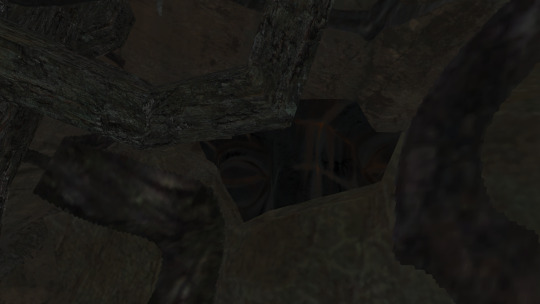

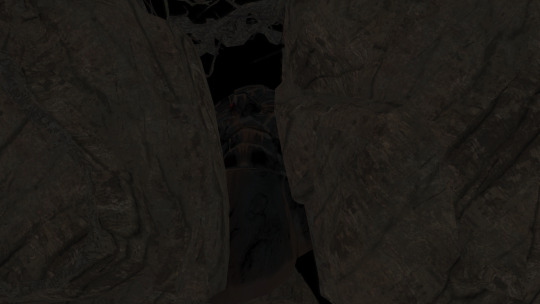
there's a metroman head in organ cave
#fallout 76#metroman#metro heads#fallout#cult of the mothman#mothman cultists#organ cave#kether does a datamining
8 notes
·
View notes
Note
To add to this, I listened to the datamined voice lines the other night and he swears by a lot of gods and a hero or two: Tymora ('s grace?), Torm ('s truth), Ilmater ('s ashes), Kelemvor (May Kelemvor judge her justly), and Dhelt ('s virtue) to name a few. I chock that up to him being in an environment that heavily references these sorts of paragons i.e. this is literate church boy cursing.
He also swears in a guttural language which some speculate might be Infernal. Specifically when he uses "mragreshem." There was a line I had trouble understanding: "May the crows feed on you, you godsdamned zergnek (sic) bastard." (Altar boy turned into quite the soldier.)
There's a line you get with Wyll, if Zevlor meets him in the Secluded Chamber after his transformation.
Wyll: I paid the price of angering the wrong devil. Zevlor: Believe me, I understand better than most. Narrator: A moment passes as Zevlor contemplates Wyll's words... I have questions/speculation about what this implies. His lines about not needing a bodyguard, because this isn't Avernus (and the followup about monsters) does make me think that he definitely annoyed the devils there, which as a paladin was kind of his job.
I don't get the feeling that Zevlor was turned/revealed as a tiefling later in life, which can happen because of devilish shenanigans. (Surprise, your ancestor made a pact, and now you have horns lol). But that's wholly speculation. Now, I'm not entirely sure about these mechanics, but Helm, the patron god of the Hellriders, had been dead for about a hundred years. He was slain in a duel in 1384 DR, came back during the Second Sundering in 1486 DR, and BG3 takes place in 1492 DR. It wasn't a secret either. So maybe the Hellriders were borrowing power from other gods? Or the nature of a specific paladin oath negated the need for patron deity? Helm is also lawful neutral, despite his noted soft spot for children. He's the Watcher, and seen more as vigilant upholder of Order than actually being warm and kind.
So Zevlor was likely an Oath of Devotion paladin, the white knight type, full of ideals and wanting to do the right thing. His god and the Hellriders, however, are sworn to uphold order, and ousting the tieflings from Elturel post-Descent would help maintain order, as unjust as it was. It's very easy to see how situation could be maneuvered to break Zevlor's oath. And why would Elturel keep a tiefling paladin with a broken oath?
Now, in his best ending, Zevlor is back as a paladin, likely Oath of Devotion based on the buffs. How did Zevlor get his groove god back? And did he go back to Helm? Or did he find someone else? Not to bring up another broken old man, but we know Ketheric god-shopped, so it's a possibility. You get sad broken old man in Act II, and then suddenly he's a lot better of in Act III with no explanation. Not complaining, give this man some happiness, but that's a big shift.
(Look, I clearly want to explore this in fan-fiction, so I'm going to stop with the rampant speculation.)
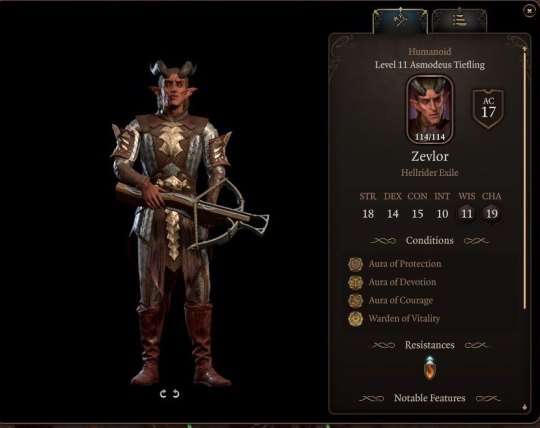
Spoiler-ish? My cousin beat the game (I'm in act 3 but have some spoilers). This is his stat screenshot from endgame and we figured he was Oath of Devotion based on the buffs. His unnamed tiefling companions are listed as Hellriders, but he remains an exile. I have opinions on what broke his oath and how. But I did wonder if him leading the tieflings out of Avernus was his "last mission for Helm." I suspect being a Hellrider would have shielded him from being ousted (minus the broken oath, and his own sense decency). And the fact he brings two (veteran-looking) tiefling Hellriders implies that the Hellriders didn't push out all their tieflings.
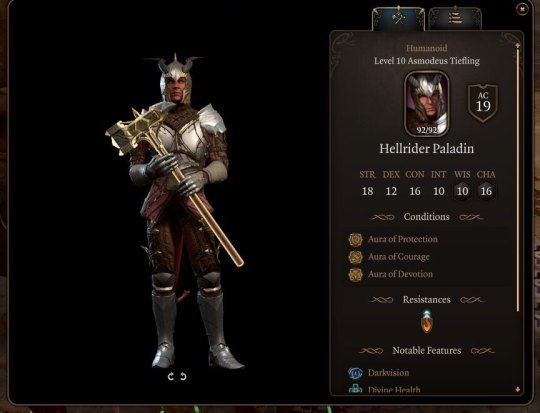
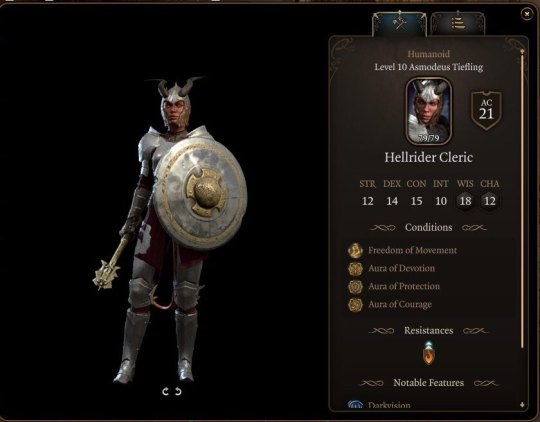
The losing faith leads to losing your paladin status theory holds water, but I'm using something else in my fanfic.
Oooh thanks!
I haven’t actually reached endgame I’ve been avoiding it for like a month ORZ so I wasn’t sure if there was anything extra when the allies come to aid you.
Devotion was my initial assumption for my fic <3 although I do have certain things I’m writing for his oath restoration/replacement 👀
Elturel as a city exiled tieflings, but the Hellrider status of them could be up in the air or even depend on who you ask in Elturel vs Baldur’s Gate, which is a potentially interesting political tension: You have “tiefling’s don’t belong in Elturel” clashing with “Hellriders are for Life”
I assume the Riders, if at least tiefling Riders, would still consider themselves such, even begrudgingly with prejudice. I mean, the ones you have here plus Tilses is a Hellrider tiefling in the grove and looks young compared to Zevlor. There were some Riders who went to Baldur’s Gate prior to the Descent as well. Even if they don’t live in Elturel I suppose they have a sense of duty to continue to protect with a Hellrider pride.
Zevlor is an interesting case as the only one we see who is specifically stated as exiled.
The idea of the tiefling journey being his final mission I think adds weight to his desperation/devotion! It’s very “My final duty and final act as a Hellrider is to protect my people” and it could very well cost him his life (which is part of the point of rider final missions) so that probably has a lot to do with why he doesn’t bother including himself in future plans.
:’)
Not all Paladins are guided by or bound to gods or faith, its the Oath that’s important, but Zevlor is tied to Helm as a Rider.
He does mention Ilmater once or twice in lines, but I think that’s just a Faerûnian thing to acknowledge gods when cursing/talking about their domain, not necessarily being devoted.
His Oath may not necessarily be tied to Helm either but the Narrator implies the loss of both are connected, if not losing faith could have been the catalyst for breaking his Oath or vice versa then at least the loss of both tied to the Descent and/or tiefling exile.
I love this sad goat man
99 notes
·
View notes